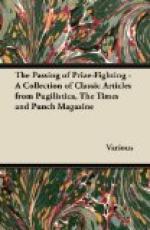Thursday, March 22nd.—The Ministry of National Service, being unprovided at present with a Parliamentary Secretary, is supposed to be represented in the House by Mr. ARTHUR HENDERSON. But as the Member for Barnard Castle has important functions to perform in the War Cabinet and is rarely in the House he usually deputes some other Member of the Government to answer Questions addressed to him. To-day the lot fell upon Mr. BECK, who good-temperedly explained, when a shower of “supplementaries” rained down upon him, that he really knew nothing about the Department he was temporarily representing. This led to a tragedy, for Mr. SWIFT MACNEILL worked himself into a paroxysm of excitement over this constitutional enormity, and finally sat down on his hat. “I only wish his head had been in it,” muttered a brother Irishman—from Ulster.
Believers in “the hidden hand,” which is supposed to paralyse our military efforts, are divided in opinion as to whether this cryptic member is most actively employed by Lord HALDANE, Sir WILLIAM ROBERTSON or Sir EYRE CROWE, Assistant-Secretary to the Foreign Office. They will probably regard Lord ROBERT CECIL’S statement that some seven years ago Sir EYRE drew up a memorandum calling the attention of Sir EDWARD GREY to the grave dangers that threatened this country from Germany as further evidence of his duplicity. The rest of the world will rejoice at Lord ROBERT’S spirited vindication of “one of the ablest of our public servants,” who, despite Miss CHRISTABEL PANKHURST, is not one of “the three black crows” of legendary fame.
When Sir H. DALZIEL, at the outset of his appeal to the Government to make another attempt to settle the Irish Question, promised that he would not “explore the noxious vapours of the past,” I feared the worst. But he was as good as his word, and spared us any gruesome excavations in ancient Irish history. Major HILLS did even better by implying that it was only during the last ten years that the question had warped and diverted our domestic politics. If all Irishmen were as reasonable and moderate as Mr. RONALD MCNEILL showed himself this afternoon it would not need settling, for it would never have arisen. He only asked, if sacrifices were necessary, that Ulster should not alone be expected to make them. Sir HAMAR GREENWOOD, as the great-grandson of a Canadian rebel who took twelve sons into the field—“almost his whole family,” added his descendant—insisted that the Colonial method of securing Home Rule was the best—first agree among yourselves, and then go to the Imperial Parliament to sanction your scheme. And perhaps, after the conciliatory spirit displayed in to-day’s debate, that is not so impossible oven in Ireland as it seemed a few weeks ago. Hitherto every attempt of the British Sisyphus to roll the Stone of Destiny up the Hill of Tara has found a couple of Irishmen at the top ready to roll it down again. Let us hope that this time they will co-operate to instal it there as the throne of a loyal and united Ireland.




